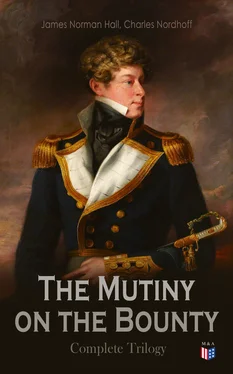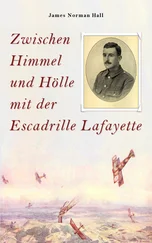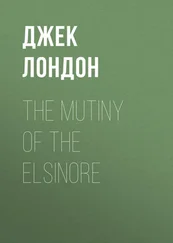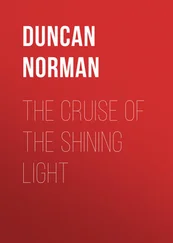To leave the ship under the eyes of the mutineers would be hard indeed; to set sail at once, in a fast and seaworthy canoe, watered and provisioned for a voyage across the open sea, would be harder still. Yet hardest of all was the thought of the alternative: “England—home, lost to us forever.”
As I stood by the gangway, deep in these disquieting reflections, Stewart touched my arm. “Look,” he said; “they are throwing the plants overboard!” Directed by Young, a line of men had formed on the ladderway, and they were beginning to pass the pots from hand to hand. A man by the rail, aft, pulled up each young plant by the roots and flung it overboard, while others emptied the earth into the sea and carried the pots to the fore-hatch. We carried more than a thousand young breadfruit trees, all in flourishing condition, and now the Bounty left a wake of their rich green foliage tossing on the blue swell. They had been gathered and cared for with infinite pains; to obtain them we had suffered hardships, braved unknown seas, and sailed more than twenty-seven thousand miles, in fair weather and foul. And now the plants, eagerly awaited in the West Indies, were going overboard like so much unwanted ballast.
“Waste!” remarked Stewart presently. “Futility and waste! And, like a good Scot, I hate both!”
It was sad to reflect on the results of the expedition: the plants thrown overboard; Bligh and his companions probably drowned or killed by savages; the mutineers, desperate and unhappy, planning to hide away forever from the face of mankind; ourselves forced to share the same hard fate.
Later, in the privacy of the berth, I told Stewart of my interview with Christian and of the gloomy prospect ahead of us. “We must tell Morrison as soon as possible,” he said.
He was silent for some time, his thin, bronzed face expressionless. At last he looked up. “At least I’ll see Peggy.”
“That’s certain, if you give your parole.”
“I’d give that, and more, for a glimpse of her!” He rose abruptly and began to pace back and forth nervously. I said nothing, and presently he went on in a low voice: “Forgive me for inflicting my thoughts on you—seamen are sentimental, and I have been long at sea. But Peggy might be the means of effecting our escape—I can think of no other.”
“That she might!” I exclaimed, for I had given the subject much anxious thought. “She could obtain a canoe for us—a favour we could ask of no other person in Matavai. Since we must give our parole we cannot make known the true state of affairs, nor why we desire to leave the ship. You will have to tell Peggy that we are planning to desert, as Churchill and the others deserted, in order to live among the Indians after the ship is gone. The chiefs alone own vessels large enough to take us to the Leeward Islands, and both Teina and Hitihiti feel themselves too much indebted to the friendship of King George to take part in what they would regard as a conspiracy against him. Peggy’s father is under no such obligation.”
Stewart seated himself once more. His mind was quicker than my own, and he had perceived in an instant what had taken me some time to puzzle out.
“Precisely,” he said. “Peggy is our only chance. I could arrange everything in ten minutes alone with her. It must be on a night when the wind holds from the east. The canoe will be paddled past the ship as if outbound on one of their night passages to Tetiaroa, and her crew must make some disturbance which will draw the men of the watch to that side of the Bounty. We can then slip overboard on the other side and swim to Peggy’s vessel, which will lie hove-to while they get sail on her. With good luck, no one will observe us in the dark.”
“By God, Stewart! I believe it can be done!”
“Must be done, rather! Morrison and I are Navy men, and we have our careers to think of. But there have been many times when I have longed to stay here.”
On the evening of the fifth of June we raised the highlands of Tahiti, far ahead and ghostly among the clouds, and on the following afternoon we sailed into Matavai Bay and dropped anchor close to Point Venus. Every man on board had been instructed what to tell the Indians of his acquaintance who might make inquiries: at Aitutaki we had fallen in with Captain Cook, Bligh’s father, who was forming an English settlement on that island. Bligh, Nelson, and others of the Bounty’s crew had been taken aboard Cook’s ship, and he had ordered the Bounty to leave the breadfruit plants with him, and return to Tahiti to trade for further stores and whatever livestock it might be possible to obtain. The ship was then to set sail in search of another island suitable for settlement.
The Indians flocked out to the ship—Teina, Hitihiti, and the other chiefs curious to know why we had returned so soon and what had become of the absent members of the ship’s company. The story invented by Christian satisfied them completely, and since he was popular—much more so than Bligh—the natives promised to furnish everything we desired, and the trading was friendly and brisk.
I dined with Christian that evening; his sweetheart and old Hitihiti, my taio, were the other guests. With the girl—who would eat nothing—at his side, Christian seemed to have shaken off for the moment the sombre mood from which he had not emerged since the mutiny. He raised his glass and smiled at me across the table.
“To our sweethearts,” he said lightly. “You can drink to mine, Byam, since you have none of your own.” Maimiti smiled gravely and touched the glass with her lips, but my taio drained his wine at a gulp.
“Stop ashore my house, Byam,” he said.
I could feel Christian’s eyes on me as I replied. “I’m sorry,” I said; “but we shall be here only a few days, and Mr. Christian has informed me that I shall be needed on board.”
Hitihiti was evidently surprised at this. He turned to Christian, who nodded.
“Yes,” he said. “He will be needed on board during the whole time we are at anchor here.” The old chief understood enough of discipline on a British ship to let the subject drop.
Peggy had come on board during the afternoon, and when I went on deck after dinner I saw the couple seated by the mainmast, in the shadow of the pumps. Stewart’s arm was about her waist and they were speaking together in the Indian tongue. When she had gone ashore, Stewart, Morrison, and I met by agreement on the main hatch. Young was the officer of the watch, and since we were at anchor and the night was calm, he had given his men permission to sleep on deck. He was a carefree, unsuspicious fellow, and now he lolled on the poop, his head turned toward the dark loom of the land. Taurua, his Indian sweetheart, kept the watch with him—a slender ghostly figure, shrouded in white tapa. The night was chilly, for it was winter in Tahiti, and Matavai Bay was a black mirror to reflect the stars.
“I have talked with Peggy,” said Stewart in a low voice, “and explained our determination to desert the ship. She thinks that I am leaving for her sake—a half-truth, at least. As for you two, she believes that you are enamoured of the Indian life, or of some of the young ladies on shore. Peggy will aid us with her whole heart. Unfortunately, the only large canoe her family possesses is at Tetiaroa. She will send a small vessel to fetch it to-morrow if the wind is fair.”
“Then let us pray for a fair wind,” said Morrison seriously.
“I wish we could take the others,” I said.
“There will be no chance of that,” Morrison replied. “Christian means to keep them confined below till the ship sails.”
“In any case there would be too many,” said Stewart. “Their very numbers would make escape impossible.”
Morrison shrugged his shoulders. “No—we can think only of ourselves. I have only one desire, one thought—to return to England. A ship will come, you may count on that, though we may have to wait two or three years for her. We shall have to be patient, that is all.”
Читать дальше











